Over the past couple of years, a certain portion of the geek/nerd community has decided the culture has been invaded. These invaders, like space aliens with malicious intent, are able to blend into the realm of geekdom and pose as ordinary geeks/nerds. No major area of geek domination is safe from this insidious invasion — not comic books, sci-fi and fantasy, gaming/computers, or anime.
Fear not, fellow geeks/nerds. We have among us self-appointed monitors who are expert at sniffing out and exposing these geek imposters. Like a Jedi, standing strong against a Sith Lord, fighting the evil empire; like a favorite superhero, these gatekeepers are vigilant, protecting the Geektropolis from these supervillains determined to take over and subvert the established norms.
Who is this terrible menace that threatens our world? You’ve seen them strutting around conventions or loitering about your favorite comic book or gaming store. Usually, they are cosplaying as a sexy comic book or anime heroines or dressed in a tight top that proclaims membership in a particular fandom. On closer contact, they prove not to possess the necessary knowledge, or enough knowledge, about that character or fandom. This horrible creature has one goal — impress or attract a Geek/Nerd Man by pretending to be interested in geek/nerd pursuits. We know it is true because Geek/Nerd Man has pronounced it to be so. It is the dreaded “Fake Geek Girl”.
How did such a pox fall upon the houses of Geekdom and Nerddom?
First, it’s the issue of how nerds/geeks, especially a number of the males, derive their identity and establish “authenticity” through “Geek Cred”. How much you know about your area of interest; what information you know on that subject — the general or the trivial minutia; how soon before anyone else you learned this information? A “pecking order” exists based on who knows the most “quality” information about a given fandom/subject. In the geek culture, knowledge is power. Any social culture that values knowledge and access above all other factors will develop a hierarchy of “gatekeeping” that defines who is in and who is out of the club. A large segment of geeks/nerds have become cliques filled with petty turf battles, antagonism, intolerance, and misogyny. Yes, some Male Geeks have founded the modern version of the He-Man Woman Haters Club. They’re afraid that “Fake Geek Girls” are gonna get their “Girl Cooties” all over the cool, geeky stuff.
Don’t get me wrong. I’m good friends with a lot of great Geek/Nerd Guys who have the utmost respect and support for women geeks. They embrace and accept without any “tests” the presence and influence of women in the culture. As many men who have written articles about the infiltration of “Fake Geek Girls” have pointed out that they don’t mean their attractive and truly geeky girl friends, I’m not talking about my Geek Guy friends here.
Unfortunately, a lot of those who subscribe to the theory of the “Fake Geek Girl” are from the “Old Guard” of geeks/nerds. As the culture developed, for many male geeks, their knowledge gave them social status within a group of like-minded individuals. Geek culture became a “safe haven” where competence was demonstrated not by physical skills but by the depth of one’s mental skills — a place one’s passionate interest could find an outlet of expression without ridicule or physical harm.
The second contributing factor is long-standing marketing practices of the industries supported by the geek audience — comic book and novel publishers, movie and television producers, and game designers and manufacturers. One group often mentioned in discussions surrounding the “Fake Geek Girl” are Booth Babes. That’s a smokescreen to justify the position. Booth Babes are hired marketing; the majority has nothing to do with geek culture other than in the mind of that company’s marketing team.
Even though there has always been a high percentage of female geeks/nerds, more products were aimed at the male end of the audience, perpetuating the myth of Geekdom as a male-dominated culture. It isn’t so much the culture as the industry that is heavily male-dominated. To appeal to the perceived mostly male audience, stories often relied on the damsel-in-distress trope. Women characters were illustrated with unrealistic, hypersexualized body proportions — a woman that could only exist in a fantasy. The products made profits in spades. The industry became complacent in this formula and female sexual objectification became the flawed norm for how women are portrayed in comic books, games, and animation.
In 2010, 17% of the members of the Animators Guild were female. In 2013, only 16% of gaming artists were female. As of this year, Marvel has 16% and DC 11% of cover, pencil, and ink artists that are female.
Industry attitudes can be summed up by this recent example:
As an excuse for why there are no playable female characters in Assassin’s Creed: Unity, Ubisoft developers stated it would have added a lot of extra production work and claimed more than 8,000 animation changes would be necessary. This position was challenged and refuted by Jonathan Cooper, a game designer on both Assassin’s Creed III and Mass Effect. Both games are popular in part for the inclusion of female characters. According to Cooper, the male and female skeleton designs for the games were identical and shared. The only difference for the female versions was adding their own unique walks, runs, and facial animations.
Leading the pack of misogynistic remarks from industry professionals is Tony Harris’s now-infamous “Fake Geek Girl” rant. Harris is a veteran comic book illustrator, creator of Starman, and two-time Eisner Award winner. At the same time he’s deriding “Fake Geek Girls”, he created an inadvertent self-condemnation about the industry attitudes:
“The real reason for the con and the damed costumes you’re parading around in? [Referring to sexy costumes of female comic book characters] That would be comic book artist and comic book writers…”
At least it tells us who is to blame for all of the objectification.
Fixing the misogyny problem that is creeping through Geekdom has to start with content creators and geek icons willing to combat the standard attitude. Why? Because the role of female geeks/nerds in the culture has been limited by perceptions of advertisers, producers, marketers, and artists. That perception trickles down, ultimately, to fans.
The third and most dangerous element to adherents of the “Fake Geek Girl” theory is female geeks/nerds. Female members of the community have been around in large numbers since the beginning of the culture. Over the years, it seemed if one claimed space in one identity (Geek), one had to downplay the other (Girl). As a group, they’ve realized a truth — a person can be both a Geek and a Girl. Female geeks/nerds are embracing their Girl as well as their Geek. For some reason, a percentage of male geeks/nerds feel threatened by this sea change.
Women are interested in geek culture for the same reason men are: We want to be in community with like-minded people who share our passion for a particular activity, like video gaming or RPGs, or fandom, like Firefly/Whedonverse or Star Trek or even Marvel or DC. The battle we’ve been forced to fight is being seen as girls and geeks equally. We have to “prove” we have “enough” knowledge to be accepted into the club. We’ve noticed that male geeks are seldom challenged on the “authenticity” of their Geek/Nerd Cred, whereas a small, obscure trivia mistake could get us excluded.
The promotion of unrealistic and physically impossible beauty standards for comic book, game, and animated heroines creates another hurdle. Attractive female geeks, especially those who cosplay, are both admired for how they look and denigrated because they don’t look exactly like the character. Or guys find them too sexy when dressed up. Therefore, these women must only be doing it to catch the attention of the hapless male geek/nerd who is just trying to read his comic book in the corner. Often, the offered excuse for the attitude is along the lines of: “Dress like that, and we’re gonna act like that.” Plus there’s a risk of being accused of being a “Fake Geek Girl”.
One of the favored targets has become the Slave Leia persona. At any convention, one can find a plethora of “Slave Leias”. It’s viewed as the “sexy” version of the character. For some, Slave Leia is the ultimate example of how a large portion of geek men view attractive geek women. There’s a portion of female geeks who have come to believe one of the only ways that women can be recognized as a desirable part of the culture is when they participate by making themselves a sexual object for the benefit of geek men by portraying a character such as Slave Leia.
I more agree with the take author Olivia Waite has on why women are drawn to cosplay the Slave Leia persona:
“[Leia] is a badass, intelligent woman who sometimes found herself kidnapped and threatened and other times did the rescuing herself… What people forget.. it’s the one costume she doesn’t choose for herself. She’s forced into it, compelled to wear that bikini for Jabba’s dubious and slobbery pleasure… Here is what Leia does, when you force her into a scanty outfit and choke chain: she takes that chain, and she kills you with it. She doesn’t let her clothing get in the way or limit her more than she can help — she waits for her moment to strike and then she conquers her would-be conquerer and saves the day.”
For most female geeks/nerds, this is how we perceive our favorite female characters. Even if all the guys see is a hot, sexy, sci-fi superheroine chick, girls focus on the qualities we find admirable and noble — individuality, strength — both physical and emotional, self-sufficiency, and independent spirit. We don’t need any misogynistic Jabba the Hutts around to tell us we’re just faking geekiness to impress them. If I were a Geek/Nerd Guy, I would be offended that there are others treating Geek/Nerd Girls in that fashion, because it reflects negatively on all.
Over the past decade, mainstream interest in topics once exclusive to geek culture has skyrocketed. The top-grossing and most popular movies are based on comic book characters. Convention attendance is at all-time highs. There are definitely more people identifying as geeks/nerds, especially among young adult females. These young women have grown up with not just the presence of technology and science in their lives, but also the ideal that they can choose to be whatever the heck they wanna be. They revel in being a “Girl”, and they proudly proclaim they are a “Geek”.
However, it seems some traditional-minded male geeks feel this female scourge threatens the safety and exclusiveness of the “established” geek culture. The Old Guard fails to recognize the NuFans are not often ridiculed for being geeks. Even the traditional “cool kids” want to be seen as geeks these days, because the geeks are the modern “cool kids”. With the takeover of technology in business and everyday life, the geeks have inherited the Earth.
The NuFans need to realize the members of the Old Guard still feel the emotional cuts and stings received in the battle to be accepted as they were growing up. Those “scars” still shape their outlook on the culture. NuFans also need to understand what makes them be labeled as “Fake Geeks” by the Old Guard, whether male or female. It’s okay that you’re a new fan. The culture needs new geeks. Be willing to admit you might not know all there is to your new-found passion.
Instead of self-appointed Guardians of Geekdom fighting to rid the Geek Galaxy of the fear-provoking “Fake Geek Girl”, established geeks should focus on acceptance and boosting the knowledge of younger geeks, not testing and judging the quality of their geekiness. Otherwise, you’re no different than the bully who made fun of you and made your life miserable for being a geek/nerd.
A lot of us geek women faced the same ridicule and misery for being a geek/nerd. A lot of the young women you criticize and label as “Fake Geek Girls” are our younger sisters, daughters, and their friends. Some of them even got geeky genes from their Geek/Nerd Dads. The influence of women on their world is immense, and the geek culture is no exception, but that’s a subject for the next article.


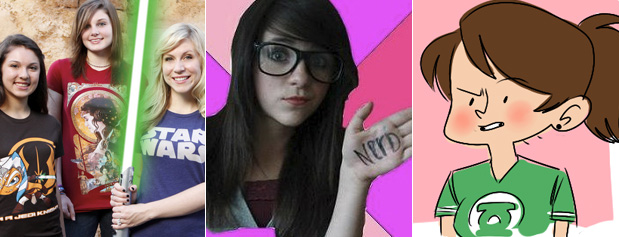
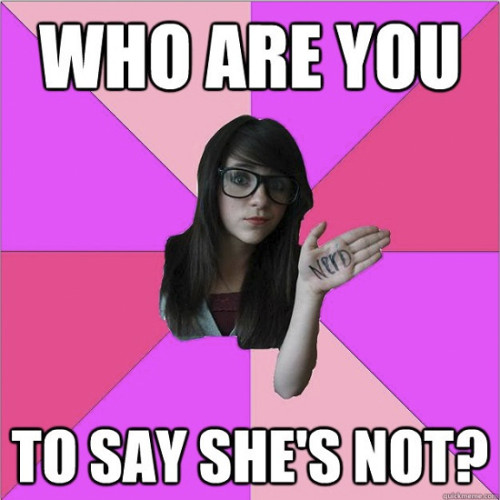
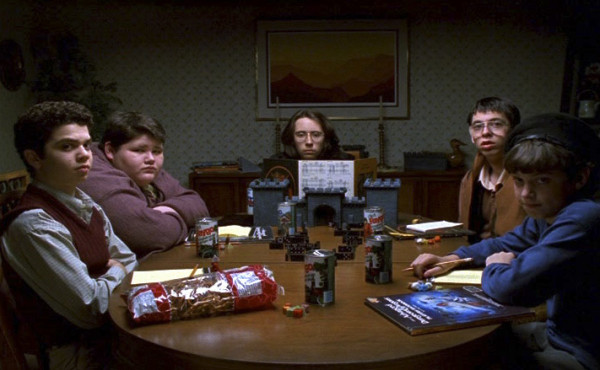

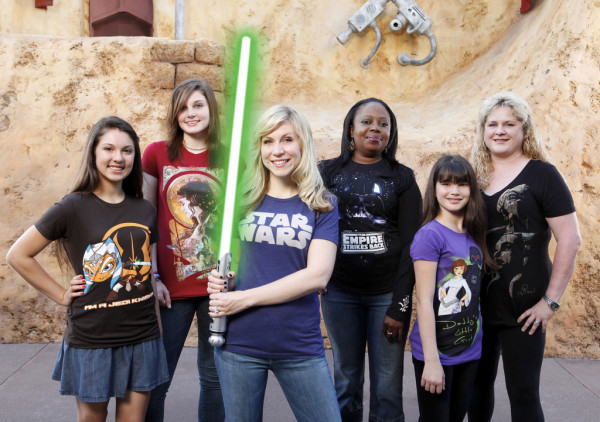
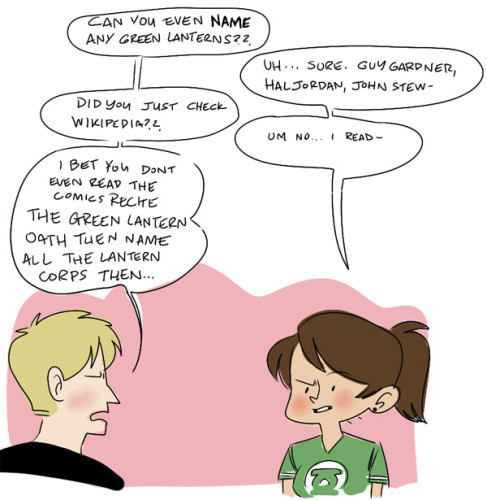
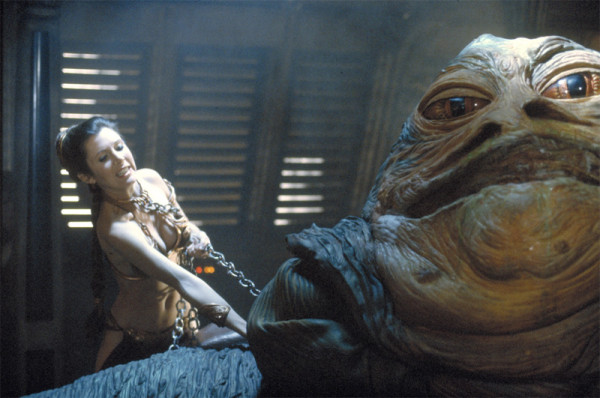
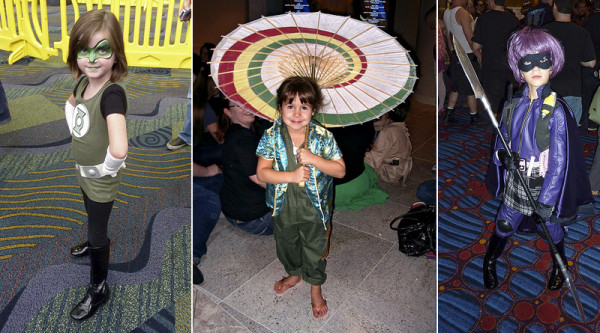

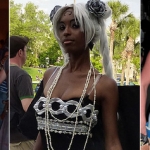

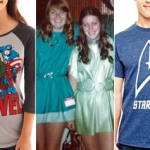
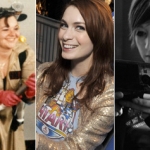
Thanks for this interesting post! My boyfriend runs a Star Trek club and would love to see me in costume at the next local convention, but I have serious issues with that – and until I read your post I couldn’t explain why. Now I know!
While I enjoy SF and fantasy, I’m not an avid fan of any particular book, film, or TV series, my trivia knowledge is pretty much zero, and I neither identify nor feel particularly connected with or drawn to any character. I don’t read comic books. I don’t get the fascination with superheroes. – Long story short: Dressing in costume would make me a Fake Geek Girl. After faking it at work all day (clothes wise, that is), I just want to be myself in what little spare time I have.
I hope I can find the right words to explain this to my Trekkie BF – who is a total sweetheart and whom I love dearly, but who lives in a totally different world than I do.